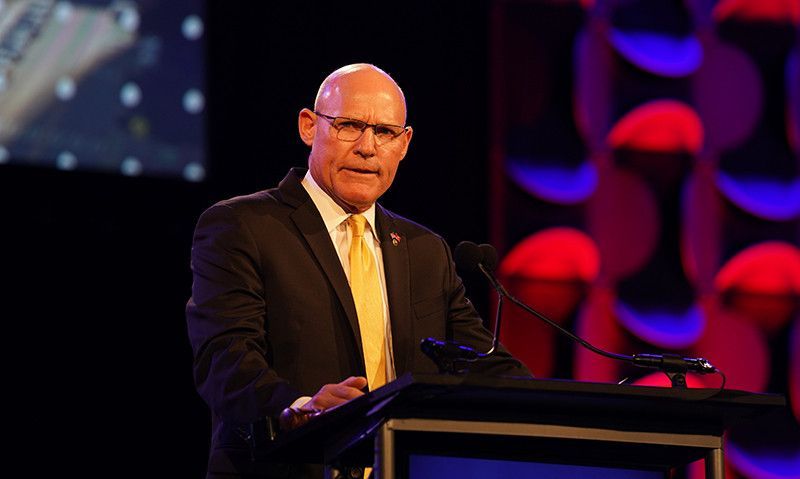
Barrett tells national convention attendees how community influencers helped him, both as a recruit and a recruiter.
At one point in a 34-year journey that led him to become the 17th Sergeant Major of the U.S. Marine Corps, Micheal P. Barrett found himself at the reins of a recruiting station for a 17,000-square-mile swath of northern Ohio, West Virginia and Pennsylvania. His area of responsibility had more than 300 high schools. The station, however, had not been effective at convincing young people to enlist.
It ranked sixth out of eight among Marine Corps recruiting stations in the district, and it stood 30th out of 56 nationally. Had he been the coach of a sports team with that kind of record, “I’d have been fired,” he told thousands of veterans gathered Aug. 29 in Charlotte, N.C., for The American Legion’s 104th National Convention.
Barrett had 21 years of service under his belt when duty took him to Cleveland. The global war on terrorism was in its infancy. “I brought my experience, my drive, my passion, my love of God, country and Corps. I brought that to the streets and to the families of Cleveland … every day, every month, it was a knife fight in a phone booth to make mission. But we did it.”
He did it by remembering a moment from his own time preparing as a “poolee” for Marine Corps recruit training. His recruiter in Niagara Falls, N.Y., never seemed to have a problem attracting young people. Every other Saturday, Barrett and his fellow poolees from the region were assembled for competitive functions – football, baseball, running, push-ups, tug of war … “to get us ready for the rigors of recruit training.”
At these functions, The American Legion, VFW, Marine Corps League and other veterans groups would arrange picnic tables and serve hamburgers, hot dogs and drinks for the young future Marines. Beyond the meals, “they would come over and talk to us, prepare us for the challenges we were about to embark on for the rest of our lives.”
One veteran Barrett met was a survivor of the Battle of Iwo Jima who did not spend time with the recruits talking about his historic time fighting in World War II. “He didn’t talk about his exploits on Iwo Jima. He talked about the brotherhood, the fact that 35 years later, from 1945 to 1980, he was still in contact with every member who survived Iwo Jima. He talked about a bond that lasts forever.”
That connection – between veterans and future servicemembers – was the recipe Barrett would apply to improve recruitment numbers in his area of responsibility over two decades later. “I immediately, after taking the mantle, went and visited all of our veterans service organizations, all of our military service organizations, all of our community influencers. Before my first year ended, we were first in the district, and we were first in the nation. This was not a coincidence. I did not do that. My recruiters are good, but it was those community influencers – it was you – the get-it-done groups.”
Barrett, a member of American Legion Post 18 in Bloomington, Ind., discussed the accomplishments of the organization throughout its history – establishment of the Veterans Administration, passage of the GI Bill “that changed the nation forever,” congressional support for a full accounting of POW/MIAs, the demand for successful studies into the effects of post-traumatic stress disorder and Agent Orange – “and today, Be the One mission. I don’t call it a campaign personally, because this is a mission. The Be the One mission is absolutely making a difference.”
He said that when “critical issues face veterans and military families – America’s must-not-fail issues – The American Legion doesn’t sit back and admire … the problem. You get at it. We still have a duty to ensure that our grand republic thrives, and the strength of our military is an imperative. We all have a unique set of skills and resources, a real and substantive connection to our communities. We are the community influencers. We are the problem solvers. We are the get-it-doners.”
He posed a question to the thousands of Legionnaires in the Charlotte Convention Center: “What if the Legionnaire family aggressively applied their unique skill set to our nation’s military recruiters, our military recruiting effort – like my recruiter did over 40 years ago … what do you think we could, we would, achieve?
“A must-not-fail mission for this nation is the physical strength of our military. Can’t this be our next get-it-done mission for our nation?”
In his closing statement, he made a plea: “Let’s bring someone to the frickin’ recruiter’s office.”
- Convention

